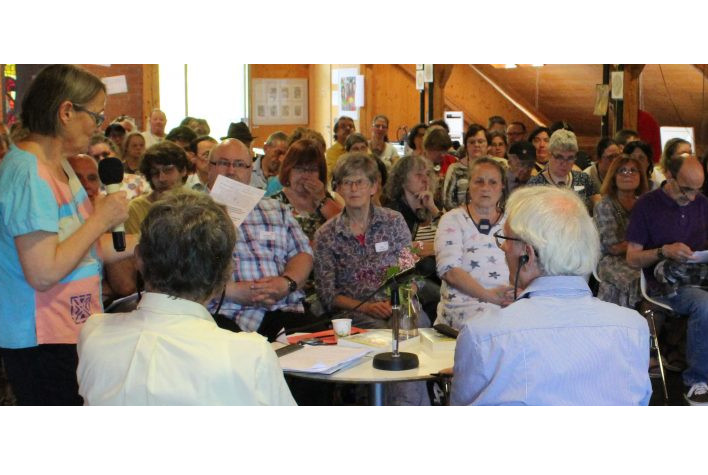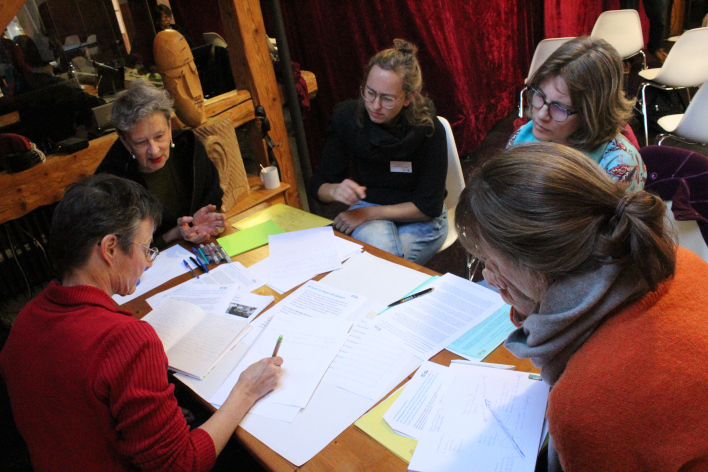Poverty, Identity, and Society in Switzerland

Above: Participants of the Poverty, Identity, and Society project
Poverty-Identity-Society
Starting in 2019, academics, practitioners1, and people with lived experience of poverty in Switzerland worked together on the Poverty-Identity-Society (PIS) research project using the Merging of Knowledge approach. The purpose of PIS is to promote social change so that injustice and institutional maltreatment — something that is all too familiar in Switzerland — does not continue from one generation to another. In order to do so, project participants are now sharing their knowledge to better understand the relationships between society, institutions and people in poverty. Their hope is to share the results with social institutions, politicians and other members of society with the end goal of changing policies, with people with lived experience at the forefront of the agenda. The research component of PIS finished in 2023 and a report was published. The project has now moved into its advocacy phase.
The project
During PIS, forty people participated in a series of Merging of Knowledge workshops. These workshops allowed different kinds of knowledge to intersect: knowledge learned through the experience of poverty in ; knowledge of law, sociology, history and economics; and knowledge gained through professional experience in areas such as child and adult protection, social services, psychology and healthcare. Below are four viewpoints on the PIS project.
Practitioner perspective
Michael Zeier, PIS coordinator and ATD Volunteer Corps member
On April 11, 2013, the Federal Councillor and Minister of Justice Simonetta Sommaruga apologised on behalf of the Swiss government for the suffering inflicted upon the victims of coercive measures supposedly meant to help people. Between 1860 and 1982, approximately 100,000 children — mostly from families in poverty — were put into foster care, orphanages or sent to farms. In most cases, their parents had no legal recourse to stop this. There, they were exploited for their labour and reduced to three “nothings”: your parents are nothing, you are nothing, and you will always be nothing.
Many members of ATD Fourth World experienced these coercive measures. Because of this, they decided to create a working group called “Historians for our children’s futures”. Between 2014 and 2019, about fifteen members of this group met regularly to support each other, learn about each other’s stories and shared history, and produce a report.
On September 16, 2017, Ms Sommaruga drove to the ATD Fourth World headquarters in Treyvaux. There, activists told her that despite the Swiss government’s apologies and attempts at institutional and political changes, poverty and suffering inflicted by institutions persisted. Touched by their words, Ms Sommaruga encouraged the working group (comprised of people with lived experience and knowledge of poverty) to investigate the country’s history. Following this, ATD Fourth World created the PIS project. They then presented the project to the Federal Office of Justice, which offered financial support and recognition.
Equal co-researchers
What distinguishes PIS is that all participants were seen as equal co-researchers. They collaborated at every stage of the project: defining the topics and research questions, producing and analysing knowledge, and co-writing the results.
ATD Fourth World’s People’s University also played an important role in this project. They helped frame one of the research topic’s central questions: What enables people living in poverty to be recognised and supported as active participants in their daily struggles, particularly in their interactions with institutions?
In 2022, the main conclusions of the research were co-written by groups of academics, practitioners, and people with lived experience of poverty.
In April 2023, those results were published in a report and presented at a public symposium. The report laid the groundwork for the conversations ATD Fourth World will engage in with Swiss politicians, institutions and learning institutions going forward so we can look for change together.
Activist perspective
Alain Meylan, ATD Fourth World activist with a lived experience of poverty
How do you view us — the most marginalised people? Are you ready to work with us, with our lived experience of poverty?
I ask these questions because society would suggest you are not. Society forces people, against their will, to enter a sort of maze where they slowly follow the path laid for them. This is because of people who think they know better than us what is right for us and our families.
When people in poverty express their discontent, they risk falling back to square one, at the start of a new, more painful path. If we keep letting this happen, the poverty gap will widen and widen until it becomes a canyon.
So I ask you: why not come together; why not work with the knowledge gained through the experience of poverty? Why are we not able to see that the people who experience poverty, who suffer from marginalisation, are also dignified, intelligent, innovative and creative people: people who can control their destiny if we just listen to them and treat them as equals?
Collaborating in research for a shared vision, as Merging of Knowledge lets us do, allows for true participation.
True participation
True participation allows us to be agents of change who can ensure that our children do not experience the injustices of poverty. I think that we should embrace this ambition: the ambition of changing our country’s politics and raising consciousness.
This project has given my life a new meaning and a new sense of direction. We work to try and understand how poverty in Switzerland passes from generation to generation and to understand the daily struggles of people who experience poverty. I can make a modest contribution to this research with the knowledge I have gained from my own experience of poverty, marginalisation, and exclusion.
Our shared vision is both national and personal. Each person has their own ambitions and projects; we must listen to them and understand them. So far, this vision of the future has been disregarded and ignored, and we must do everything we can to fight this. History has shown us that the errors of the past must not be repeated.
Personal and a collective journey
Sophie Neuhaus, Youth Delegate for the Swiss canton of Neuchâtel
Participating in the Merging of Knowledge is both a personal and a collective journey.
It’s personal because it opens our eyes to the discrepancy between the intentions of social work as a profession and the reality of those working in it. It’s collective because if we recognise this discrepancy, we must study and unpack it together in order to understand it better.
“Institution”
As a part of the project, we used images and a phrase to illustrate what “institution” means to each of us in our peer groups. The results of this work struck me in particular and highlighted one of the discrepancies between those with lived experience and those without. The images and the words used by the two different peer groups are very similar: ropes and chains. But while the images were similar, what they represented for each group was completely different. For the professionals, the images depicted the intention to help; for those with lived experience of poverty, the images represented feelings of constraint and loss of power.
How can such a large gap exist between institutional policies and those the institution is meant to help?
End user’s reality and experience.
At this point, if I had to identify the main reason, I would say that it’s because the services that institutions deliver were not designed with input from the people they were meant to benefit. As a result, they don’t really consider the end user’s reality and experience. This gap also translates into the language we use, which can sometimes be harmful. Take the phrase “vulnerable people,” a term practitioners use with good intentions. Still, for those who experience poverty in Switzerland, it can undermine their dignity and show a lack of appreciation of their everyday reality, the complexity of their lives, and their little-known struggles.
I’ve had these sorts of realisations all throughout my participation in PIS. Building from our individual experience, pooling our knowledge in peer groups, and coming together to share the results allowed us to look into these discrepancies, analyse them, and understand them. They became the material with which we built a collective understanding despite the many differences of the participants. Ultimately, all the participants have a great deal of respect for each other, in part because we all know why we are participating: to find ways to be better, together.

Academic perspective
Caroline Reynaud and Sophie Guerry, professors at the College for Social Work in Fribourg
The role of academics in Merging of Knowledge might at first seem easier or less demanding than that of the other groups. It’s about invoking theoretical knowledge as opposed to sharing your personal experience of poverty or professional hands-on experience. However, our participation in the project has shown how demanding and often destabilising this process can be.
One of the main difficulties is to find your “place” in the conversation. While at the same time avoiding positioning academic knowledge (which is already valued and legitimised in society) on a pedestal and thus reproducing the hierarchy of knowledge present in our society and challenged by ATD Fourth World.
At what moment is it appropriate to speak up? How do we best go about it, especially when it calls another group’s contribution into question? How do we quickly and simply explain a theory without misrepresenting or distorting it?
At the start of PIS, these questions were sometimes reinforced by the reactions of the other groups to what we said. For example, during the first workshop, those with a lived experience of poverty in Switzerland were surprised that the responses of academics to the project’s ground rules were so similar to theirs. On the contrary, this seemed quite normal to us since some of us take the perspective of the end user. It was disconcerting to learn that we did not conform to what the other groups expected of us as academics. What then was expected of us, and what could we bring to the table that was different?
Here’s another example: when we spoke of “relations of power” as a framework for the interactions between individuals and institutions, certain members of the group of professionals were offended. They interpreted the concept as a deliberate attempt to undermine them and one which they did not see in their work.
When we explained in more detail, people could understand us better and began to use this concept.
The reactions of people affected by poverty also reminded us that certain terms, largely used in the academic community to describe social control, can be shocking or understood differently when applied to the individual’s life experience.

